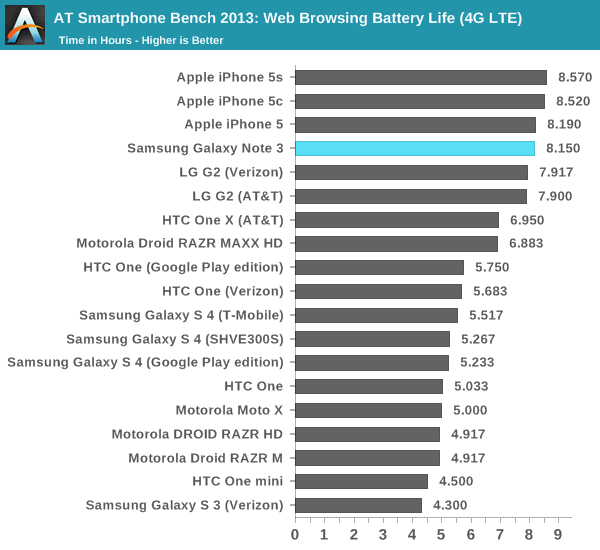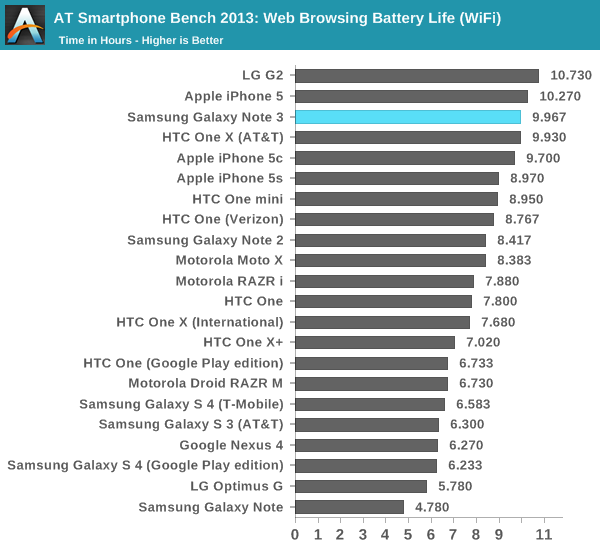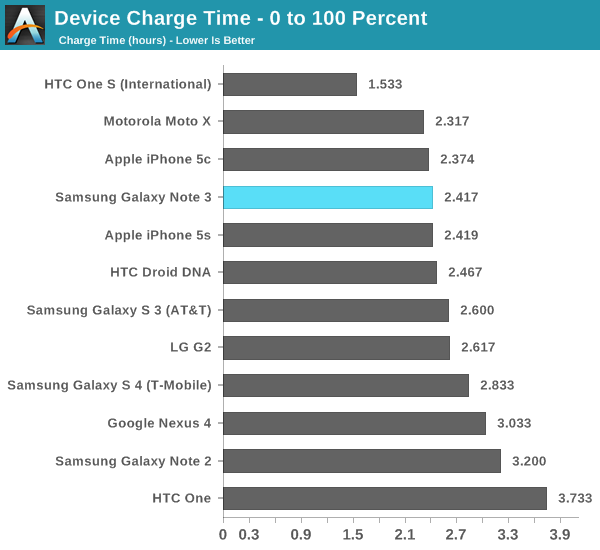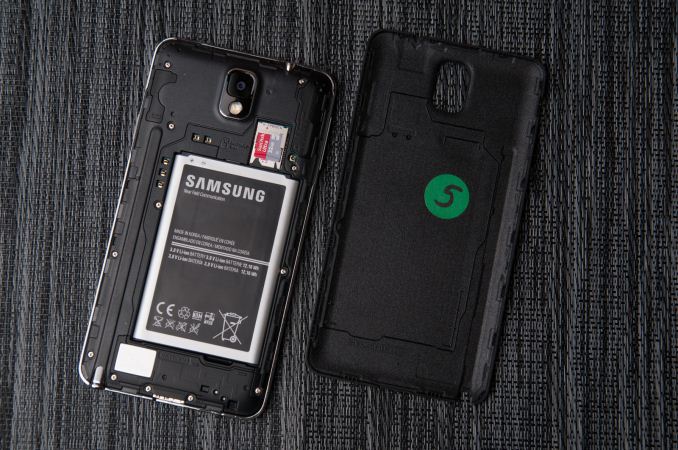Samsung Galaxy Note 3 Review
by Brian Klug on October 1, 2013 9:00 AM EST- Posted in
- Smartphones
- Samsung
- Mobile
- Android 4.3
- galaxy note 3
Battery Life
Battery life remains probably the single largest differentiator for devices lately, and of huge concern to enthusiasts and normal shoppers alike. We’ve already caught a glimpse of how well 8974 fares from a power perspective inside the LG G2, a device that posted some seriously impressive battery numbers. The Note 3 we’re looking at is also 8974 based since it’s a T-Mobile model, and thus we expect the same kind of battery life.
With this generation of Note, battery gets even larger. The Note started with a then quite large 9.25 watt hour battery, then Note 2 moved to 11.78 watt hours, and Note 3 now moves to a very large 12.16 watt hour battery with of course the newest 3.8V chemistry and all that comes along with it. Display size goes up, but those power gains are offset in other places.
After we talked about the panel self refresh features in the G2 a few people reached out and let me know that this feature has been shipping for a while in some phones, and it’s easy to check for. If we look under the display subsystem we can see that the same MIPI_CMD_PANEL type 9 is used, which refers to this type of interface.
Qualcomm HWC state: MDPVersion=500 DisplayPanel=9
define MIPI_CMD_PANEL ‘9’
Our battery life tests are unchanged and consist of a set of popular webpages that are loaded on a schedule with the display set to exactly 200 nits and repeated until the battery runs out and the device dies on both WiFi and cellular data connections. In this case that means T-Mobile LTE which is 10 MHz FDD in my market, I haven’t had a chance to run the Note 3 on HSPA+ yet, or complete the call test (which is starting to get ridiculous, and probably breaks 24 hours in the case of the Note 3).

On LTE the Note 3 does very well, coming just shy of the pack of iPhones, at just over 8 hours. Interestingly enough it’s just north of the G2s as well, which do have a smaller battery but also smaller display. The Note 3 also is the first device to ship with Qualcomm’s QFE1100 envelope tracker solution from the RF360 front end portfolio, which lowers power consumption by up to 20 percent and heat dissipation by up to 30 percent by allowing the power amplifiers to follow the desired output waveform. There’s more on that later in the cellular section.

On WiFi the Note 3 does better by 22 percent, but not the kind of huge jump I’m used to seeing between cellular and WiFi testing. This tells me the Note 3 battery life is really gated by the display, which is almost always the largest consumer of power in a device. That said the Note 3 does very well all things considered, especially in comparison to the APQ8064 (Fusion 3) phones which came before it, like SGS4. New silicon and new process inside MSM8974 definitely helps move battery life forward here with the race to sleep game.
Charging is an interesting story on the Note 3, but primarily because of what doesn’t change. The Note 3 continues to use Samsung’s tablet charging specification and charger, which has 2 amps of maximum output. The Note 3 draws 2 amps over a considerable amount of the charging curve, like other Samsung devices (in the linear part of the charge curve). USB 3.0 doesn’t change things up here quite yet with the new supported charge voltages that are coming eventually with the power delivery specification.

The Note 3 does charge faster overall compared to the SGS4 however thanks in part to the new PMIC (PM8941) which is part of the overall 8974 platform story.











302 Comments
View All Comments
smartthanyou - Tuesday, October 1, 2013 - link
Struggling? I don't understand. They are cheating, it seems simply enough of a concept to me. The fact that others are doing seem irrelevant.If you a review a product that is doing this shine a big bright light on it. You might also consider calling out other reviews of the same product that ignore the problem.
vFunct - Tuesday, October 1, 2013 - link
A simple repackaging of benchmark tests so that they can't be detected by Samsung would do. At this point just assume that all vendors cheat, and set up your benchmark suites so they aren't detected.We want to know how these products act in the real world, and benchmarks are supposed to represent that.
We don't want fake results.
itpromike - Tuesday, October 1, 2013 - link
Anand, what Ars did to circumvent the benchmark fluffing was recompile the application with different package names... could you do something similar, then re-run your benchmarks and update this article? Or are your benchmarks already circumventing the fluff?DERSS - Tuesday, October 1, 2013 - link
Do not struggle over this. Put an asterisk at SGN3 results with note that in reality (versus overdrive mode for test) this device is not any faster than LG G2. It would be fair; problem solved.dugbug - Wednesday, October 2, 2013 - link
Yeah I've wondered if geekbench will respond similar to the juicing debate among baseball statistics nerds. Do they purge the benchmarks... or placing an asterisk.... or just nothing. Let specs chasers live in a weird little unaware lie.Voldenuit - Tuesday, October 1, 2013 - link
"We've been struggling with how to deal with this one for a little while now."Easy. Rename article headline to:
"Shamesung Galaxy Note 3. Cheaters Never Prosper".
Also, put a strikethrough on all the Samsung benchmarks.
bji - Wednesday, October 2, 2013 - link
You should ask that the benchmark authors make their tools harder to cheat on. The should randomize the name of the benchmark program at installation time or something, similarly with whatever values are necessary to be randomized to prevent the benchmark from being detected as a benchmark by the cheaters.Obsoleet - Tuesday, October 8, 2013 - link
I've seen a lot of unprofessional stuff going on at AT, regarding Nvidia and Intel for years. I have no skin in the game regarding Samsung, the Note3 or anything else but I really find this to be the last straw. I actually use a GS3.I'm done reading your site, Anand.
Call it cheating. That's what it is, you know it. What is your problem? How can we trust you or your staff??? Wake up and stop taking bribes, or whatever is causing you to do this kind of crap.
Chillin1248 - Tuesday, October 1, 2013 - link
I agree.As an extremely long time Anandtech reader, I am very disappointed that they decided to run the benchmarks with the "boost" in place instead of trying to figure out how to disable them (like ARSTech) or waiting for a workaround.
These benchmark results should be re-run with ARSTechnica's method in place of the artificially inflated scores we have now here.
Squuiid - Tuesday, October 1, 2013 - link
+1. You are essentially offering a more favorable review with inflated benchmarks and actively encouraging this deception. It's no wonder Samsung continue to cheat.